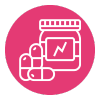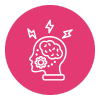- Select
- Addiction
- Rehab Treatment

Written by:
Last Updated:
January 22nd, 2025
Stimulant Addiction
Prescription stimulants can be a huge help with the symptoms of ADHD or narcolepsy, but what happens when they take over your life? Stimulant addiction is an often overlooked condition, but it can affect every part of your life. It is important that anyone who is using stimulants, either by prescription or otherwise, is fully aware of the risks and where to seek help if needed.
What are stimulants?
This page focuses on prescription stimulants which are medicines that increase alertness, attention and energy. These stimulants are prescribed to treat conditions like Attention Deficit Hyperactivity Disorder (ADHD) and narcolepsy because they increase the levels of certain chemicals in the brain that help with focus, energy levels and impulse control.
Common types of prescription stimulants include:
- Amphetamines: These include medicines like Adderall and Dexedrine, which are commonly used to treat ADHD.
- Methylphenidate: This includes Ritalin and Concerta, also used to manage ADHD symptoms.
- Modafinil: This medicine is most commonly prescribed for narcolepsy as well as some other sleep disorders.
In the UK, the number of people receiving prescription stimulants has significantly increased over recent years, particularly for ADHD. As of 2023, 233,000 people in England were receiving central nervous system stimulants and medicines for ADHD, a figure that has more than doubled over the past eight years.
While prescription stimulants can all be very useful, negative side effects are common, and in rare cases, they can even be quite serious. These include:
- Increased heart rate and blood pressure
- Insomnia
- Loss of appetite
- Anxiety and nervousness
- Headaches
- Nausea
- Mood swings
- Prescription stimulant addiction
What is stimulants addiction?
Stimulant addiction is when you can’t stop taking stimulants even though they are harming your health or causing other problems. Prescription stimulant addiction often develops because someone starts misusing their prescription or because of recreational stimulant abuse.
Stimulant abuse has become an ever-growing problem, with people who don’t have any medical need for the drugs taking them to get high or as a study, athletic or work performance aid. What often happens is that after days or weeks of stimulant abuse, one pill no longer works, so they need to take more.
This essentially floods the body with stimulants to the point where the brain needs them to produce or manage important chemicals. This reliance is called physical dependency, and it causes withdrawal symptoms if you stop taking stimulants suddenly or try to cut down.
This physical dependency is only one-half of stimulant addiction, as you can also become mentally and emotionally reliant on them. This means that they take over your life completely, and you start to believe you need stimulants to function “normally”. At this point, you will keep taking stimulants no matter what problems they are creating in your life – the definition of stimulants addiction.
What are the most common stimulant addictions?
Three of the most common forms of stimulant addiction are:
Adderall Addiction
Adderall addiction can sneak up on you, turning a helpful medicine into something you feel you can’t live without. Adderall is often misused to boost focus and energy but this can quickly lead to needing more and more to get through the day.
Focalin Addiction
Focalin addiction often happens when you start taking it more often than prescribed for its stimulating effects. Before you know it, you might feel like you can’t function normally without it, leading to cravings and dependency.
Ritalin Addiction
Ritalin addiction can develop when you rely on the drug for more than just treating ADHD symptoms. Misusing it to stay awake or enhance concentration can lead to a cycle where you need it to feel okay, making it hard to stop even when it harms your health.
Stimulant addiction signs to look out for
One common feature of prescription drug addiction is that it often goes unnoticed for longer than with illegal drugs. This is often because the person started taking the medicine, at least at first, for a genuine reason and doesn’t notice the emerging problem. Here are some stimulant addiction symptoms to look out for:
- Constantly planning when you can take your next pill and watching the clock until it’s time.
- Noticing your stimulant dosage gradually creeping up due to developing tolerance.
- Seeing your chores piling up or work performance slipping as you prioritise stimulant use over everything else.
- Feeling withdrawal symptoms when you try to quit, like tiredness, depression or trouble concentrating when you don’t take your stimulants.
- Becoming secretive about your stimulant use, lying to friends or family or even stealing to get more stimulants.
- Denying these issues or continuing to use stimulants even though you recognise them.
What makes stimulants addictive?
Aside from their effects, which can be appealing to some people, there are also several reasons why you may be more susceptible to developing a stimulant addiction. These can be things you were born with or have acquired over time:
Genetics
Just like some people are more likely to have blue eyes or curly hair, some people are genetically predisposed to addiction. This means that if addiction runs in your family, you might be more at risk.
Mental health issues
Conditions like anxiety, depression or ADHD can make you more likely to misuse stimulants. You might start using them to cope with your symptoms but over time, this can lead to dependency.
Stress
High levels of stress, whether from work, relationships or other sources, can drive you to use stimulants as a way to manage or escape your problems.
Peer pressure
If you’re surrounded by people who use stimulants, you might feel pressured to join in. This is especially common in high-stress environments like universities or certain competitive careers.
Early exposure
Starting to use drugs at a young age can increase your risk of addiction later in life. Essentially, the younger you are when you start, the more likely you are to develop a stimulant addiction.
Environment
Living in an environment where drug use is normalised can make it seem less risky and more acceptable. This can increase your chances of trying and continuing to use stimulants.
The dangers of stimulant addiction side effects
As with all types of addiction, stimulant addiction can harm your relationships with your loved ones, cause all kinds of issues at work and school and put you in financial or even legal difficulties. There are also many stimulant addiction side effects on health, which can be very serious. Here are some key ones to be aware of:
- Heart problems: Stimulants can increase your heart rate and blood pressure and cause heart attacks, strokes or other serious cardiovascular issues.
- Sleep disturbances: Because stimulants keep you awake and alert, they can disrupt your sleep patterns, leading to insomnia and chronic tiredness.
- Mental health issues: Long-term stimulant abuse can worsen anxiety and depression and lead to mood swings, paranoia or even psychosis.
- Weight loss and malnutrition: Stimulants often suppress appetite, resulting in significant weight loss and nutritional deficiencies.
- Stimulant overdose: Taking too many stimulants or mixing them with alcohol or other drugs can cause high fever, convulsions, heart failure and even death.
How is stimulant addiction treated?
Stimulants addiction treatment has three main parts, which are provided at Banbury Lodge:
1. Stimulant detox
Prescription drug detox is where your body clears itself of stimulants. This process can be tough because of withdrawal symptoms. As explained above, our medical team can help manage these effects safely.
2. Stimulants rehab
Rehab treatment is where the real work happens, focusing on therapy and counselling. You will learn why you turned to stimulants and get tools to handle life’s stresses without them.
3. Aftercare
Aftercare is all about keeping you on the right path once you’re out of prescription drug rehab. It includes support groups, lifestyle planning and continued therapy to help you stay strong and avoid slipping back into old habits.
Get help for stimulants addiction today
Stimulant addiction can feel like a life sentence, but breaking free is absolutely possible. Banbury Lodge provides a safe and supportive environment where you can start your recovery journey under our recovery team’s expert guidance. Don’t wait – reach out to Banbury Lodge today and take the first step towards a new life.
Frequently Asked Questions
(Click here to see works cited)
- CDC. “Stimulant Overdose | Overdose Prevention.” CDC, 8 May 2024, https://www.cdc.gov/overdose-prevention/about/stimulant-overdose.html. Accessed 7 August 2024.
- Dingfelder, Sadie F. “The danger of stimulants.” American Psychological Association, 1 October 2011, https://www.apa.org/monitor/2011/10/stimulants. Accessed 7 August 2024.
- Information | UK Rehab.” UK-Rehab, https://www.uk-rehab.com/stimulant-addiction/adderall/. “Stimulants – Adderall Addiction Information | UK Rehab.” UK-Rehab. Accessed 7 August 2024.
- UK-Rehab. “Stimulants – Ritalin Addiction Information | UK Rehab.” UK-Rehab, https://www.uk-rehab.com/stimulant-addiction/ritalin/. Accessed 7 August 2024.
- Weyandt, Lisa L et al. “Prescription stimulant medication misuse: Where are we and where do we go from here?.” Experimental and clinical psychopharmacology vol. 24,5 (2016): 400-414. doi:10.1037/pha0000093. Accessed 7 August 2024.








